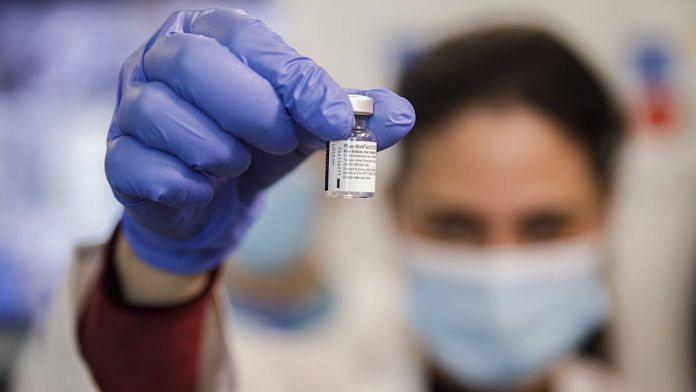
New Delhi: Antibody response in people aged over 80 increases three-and-a-half times if they take the second dose of the Pfizer Covid-19 vaccine after 12 weeks compared to those who receive it at a three-week interval, a new study has found.
The finding comes days after the UK government decided to reduce the gap between the two doses of vaccines to arrest the spread of the B.1.617 variant of the virus that was identified in India.
The study, led by the University of Birmingham in collaboration with Public Health England, was conducted among 175 people who were above 80 years and living independently.
The study is the first direct comparison of the immune response in an age group between those who are given the second Pfizer vaccine at a three-week interval and those at a 12-week interval.
The Pfizer vaccine was initially authorised for a three-week interval between doses. However, several countries, including the UK, chose to expand this to a 12-week interval to allow a higher percentage of the population to receive at least the first dose.
What the research says
The research, which is yet to be peer-reviewed, found that extending the second dose interval to 12 weeks increased the peak SARS-CoV-2 spike specific antibody response 3.5-fold.
The team concluded that extending administration of the second Pfizer vaccine to 12 weeks potentially enhances and extends antibody immunity, which is believed to be important in virus neutralisation and prevention of infection.
“This is the first time antibody and cellular responses have been studied when the second vaccine is given after an extended interval. Our study demonstrates that peak antibody responses after the second Pfizer vaccine are markedly enhanced in older people when this is delayed to 12 weeks,” Helen Parry, lecturer at the University of Birmingham, said in a statement.
“This research is crucial, particularly in older people, as immune responses to vaccination deteriorate with age. Understanding how to optimise COVID-19 vaccine schedules and maximise immune responses within this age group is vitally important,” Parry added.
“The enhanced antibody responses seen after an extended interval may help to sustain immunity against COVID-19 over the longer term and further improve the clinical efficacy of this powerful vaccine platform,” Paul Moss, a professor at the University of Birmingham and Principal Investigator of the UK Coronavirus Immunology Consortium, said in a statement.
Blood samples analysed
The team analysed the blood samples of the participants after the first shot, and then again two to three weeks after participants had received their second shot.
Ninety-nine participants had the second vaccine at three weeks, while 73 had the second dose at 12 weeks.
After their second vaccine, spike-specific antibodies were detected in all participants no matter how far apart their doses were. However, after the second vaccine the average concentration of antibodies was 3.5 times higher in the 12-week interval group compared to the three-week interval group.
“The higher antibody responses in people receiving two doses of the Pfizer vaccine using an extended 12 week interval provides further supportive evidence of the benefits of the UK approach to prioritise the first dose of vaccine,” Gayatri Amirthalingam, Consultant Epidemiologist at Public Health England said in a statement.
Subscribe to our channels on YouTube & Telegram
Why news media is in crisis & How you can fix it
India needs free, fair, non-hyphenated and questioning journalism even more as it faces multiple crises.
But the news media is in a crisis of its own. There have been brutal layoffs and pay-cuts. The best of journalism is shrinking, yielding to crude prime-time spectacle.
ThePrint has the finest young reporters, columnists and editors working for it. Sustaining journalism of this quality needs smart and thinking people like you to pay for it. Whether you live in India or overseas, you can do it here.